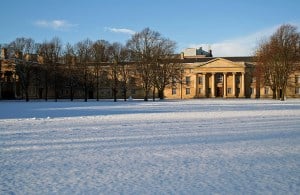C.P. Snow and the Two Cultures: Where Are We Today?
About the Author
Stephanie Allen read Classics and English at St Hugh’s College, Oxford, and is currently researching a PhD in Early Modern Academic Drama at the University of Fribourg.
 On the 7th of May 1959, in Cambridge University’s historic Senate House, the scientist and writer C.P. Snow delivered a speech that would leave a near-indelible impression on the intellectual consciousness of his generation.
On the 7th of May 1959, in Cambridge University’s historic Senate House, the scientist and writer C.P. Snow delivered a speech that would leave a near-indelible impression on the intellectual consciousness of his generation.
You should also read…
His lecture, subsequently published in a book called The Two Cultures and the Scientific Revolution, argued that ‘the intellectual life of the whole of western society’ was divided into two quite separate parts – namely, the sciences and the humanities – and that the two kinds of academic pursuit were separated by an ever-deepening gulf of incomprehension, dislike and mistrust.
The arts and humanities – including subjects as diverse as history, anthropology, music or fine art – Snow grouped under the umbrella of ‘traditional culture’. He argued that the backward-looking, change-averse, conservative British society in which he lived placed too much emphasis and prestige upon these subjects, whose relevance and worth was waning.

By contrast, too little store was set by the scientific knowledge that had helped Britain win the Second World War and rebuild its economic prosperity in the years that followed. Snow rebuked partisans of the ‘traditional culture’ (that is, writers, artists, musicians, historians and the like) for, as he saw it, continuing to assert their superiority ever more fiercely in the face of palpable, ubiquitous decay: ‘The traditional culture,’ Snow asserted, ‘which is, of course, mainly literary, is behaving like a state whose power is rapidly declining – standing on its precarious dignity, spending far too much energy on Alexandrine intricacies, occasionally letting fly in fits of aggressive pique quite beyond its means, too much on the defensive to show any generous imagination to the forces which must inevitably reshape it’. Among the literati of his generation, Snow diagnosed a pervasive, unjustified snobbery about the intellectual achievements of scientists. His argument is perhaps best summarised in a frequently-quoted passage from his speech:
A good many times I have been present at gatherings of people who, by the standards of the traditional culture, are thought highly educated and who have with considerable gusto been expressing their incredulity at the illiteracy of scientists. Once or twice I have been provoked and have asked the company how many of them could describe the Second Law of Thermodynamics. The response was cold: it was also negative. Yet I was asking something which is the scientific equivalent of: Have you read a work of Shakespeare’s? (…) I now believe that if I had asked an even simpler question – such as, ‘What do you mean by mass, or acceleration’, which is the scientific equivalent of saying, Can you read? – not more than one in ten of the highly educated would have felt that I was speaking the same language. So the great edifice of modern physics goes up, and the majority of the cleverest people in the western world have about as much insight into it as their neo-lithic ancestors would have had.

As you’ve perhaps guessed by now, Snow’s anecdotal and undeniably rather crude argument falls heavily on the side of ‘men of science’ (the women, presumably, were all too busy counting their doilies and trying to get Brussels sprouts to absorb huge quantities of water to care much about the life of the mind). The scientist-cum-writer paints a vibrantly utopian, if rather vague and facile, picture of scientific culture. In opposition to its artistic counterpart, the republic of science is ‘expansive, not restrictive, confident at the roots, the more confident after its bout of Oppenheimerian self-criticism, certain that history is on its side, impatient, intolerant, creative rather than critical, good-natured and brash’. In fact, it is the lack of correspondence between the two branches of knowledge – or more specifically, the refusal of the ‘traditionals’ to cede authority and respect to their dynamic, progress-loving colleagues – that Snow finds to blame for all the world’s main problems: the threat of nuclear war, overpopulation, and the gap between rich and poor.
Now, if all this seems like a bit of a muddle, that’s because it is. It’s a bit ungenerous to engage with Snow nearly sixty years after he first delivered the speech, but I’m going to anyway, partly because of the huge success and influence he enjoyed off the back of it (on which, more later), and partly because even if I’d been alive back then, I’d have been too busy cultivating marriageable attributes even to be accounted for in his argument – let alone to dispute it.

A not-especially-picky reader of The Two Cultures might observe that the persistent threat of nuclear war that darkened the second half of the last century, far from being precipitated by people in jumpers declining Latin verbs and reading the works of Milton, was actually very much a direct result of ‘impatient, intolerant, creative’ scientific culture. Another reader might concentrate their critical energies elsewhere, and remark that, even back in the fifties, there wasn’t a huge amount of originality in the observation that many bookish people can’t get their heads round calculus, while lots of chemists balk at the thought of self-expression through watercolour painting. Another might question the reliability of a diagnosis of the intellectual life of the western world whose sole evidence seems to be that the man making it was ‘by education a scientist, by calling a writer, at one time moving between groups of scientists and writers in the same evening’. Despite all its (to my mind, glaring) flaws, though, Snow’s speech was remarkably well-received: it was published as a book in a number of months, and continues to be taught as a staple of many philosophy and sociology courses to this day. Perhaps the biggest testament to Snow’s standing, and confirmation in a role of sage and social commentator, was that in the early 60s, the British prime minister Harold Wilson invited him to become a minister in the newly created Ministry of Technology – despite the fact that Snow had never held any elected office or other political position. Snow had very much hit the big time.

But if everything at this point seemed fairly unquestioningly rosy, there was one person at least whose nose Snow had really knocked out of joint: the Cambridge literary and social critic FR Leavis. In 1962, Leavis delivered a lecture entitled ‘The Significance of CP Snow’ to assembled fellows, students and members of the public in Downing College, Cambridge. The lecture was so viciously personal, so sarcastically dismissive, and so unrelentingly withering that its author would be angrily attacked in the pages of national newspapers for weeks to come. Now, the ostensible point of Leavis’s speech was twofold: first, to challenge Snow’s vision of ‘two cultures’, and second, to criticise the society that had conferred such status and respect on Snow himself. As Stefan Collini, a recent editor of Leavis’s speech, sums it up: ‘(Leavis’s) real target was the dynamics of reputation and public debate – the ways in which certain figures are consecrated as bearers of cultural authority’. But it is impossible to read the speech without getting the distinct sense that Leavis’s real issue, despite all his protestations to the contrary, was with Snow himself.

The speech opens in the devastatingly contemptuous tone that will pervade it: “If confidence in oneself as a master-mind, qualified by capacity, insight and knowledge to pronounce authoritatively on the frightening problems of our civilisation, is genius, then there can be no doubt about Sir Charles Snow’s.” Leavis’s target is Snow’s intellectual status, his right to pronounce on public and social issues, and this he attacks in varying shades of sarcasm throughout: from the mocking “Of course, anyone who offers to speak with inwardness and authority on both science and literature will be conscious of more than ordinary powers…” to the more straightforward “Snow is in fact portentously ignorant”; “Snow expresses complacently a complete ignorance”, and “he is as intellectually undistinguished as it is possible to be”. Leavis nowhere sugars the pill, dismissing his opponent’s literary creations, “Snow is, of course, a – no, I can’t say that; he isn’t; Snow thinks of himself as a novelist” and observing that his lecture was totally void of all the scientific insight its author claimed to possess: “all we get is a show of knowledgeableness”.
Though it’d certainly be more fun to fill the rest of this article with Leavis’s catalogue of insults, and the retorts that Snow published in newspaper articles and books over the years to come, I must now (reluctantly) turn to the question with which I opened: where are we today? I’d like to structure my observations around Snow’s two main points: that there existed a gulf of misunderstanding between the sciences and humanities, and that this presented a barrier to addressing the world’s problems. Next, I’ll turn to some of the points Leavis made in his reply.

I must first confess that I don’t know the first law of thermodynamics. I don’t even want to know what thermodynamics is – something to do with joules and combustion temperatures and atoms, I imagine, so complex and confusing that trying to understand it would send me into a state of mental stupefaction from which it would be impossible, perhaps ever, to recover. But I do know most of the basic rules of modern technology: that coffee and the keyboard of a MacBook Pro are natural enemies, for example; and how to save documents to Dropbox; and that the answers to all technological problems, no matter how complex, can be found by Googling the error number. The terms of the divide Snow perceived in intellectual culture have changed in ways too numerous to mention: it’s probably still true that many artsy folk are naturally mistrustful of, and willfully uneducated about, all things scientific (and scientific knowledge becomes more specialised and impenetrable every time something new is discovered or invented, which seems to be roughly about every four seconds), but those same artsy folk now own digital cameras and fancy mobile phones, and use Photoshop and Google Maps. The average person of our generation is actually astonishingly scientifically-savvy (if you don’t believe me, simply observe what happens when your dad thinks it’s a good idea to buy your grandmother an iPad for Christmas, and then spends an hour a night over the subsequent six months trying to teach her to turn it on. My granny’s iPad now sits proudly on a table in her living room, and is vigorously polished once a week, but remains decidedly off). What’s more, if the humanities ever did enjoy a position at the top of a putative hierarchy of subjects, their day is definitively over: I am, of course, generalising, but in my circle of friends the engineers, mathematicians, physicists and IT-graduates found brilliant, incredibly well-paid jobs after they left university, while we English grads were faced with the prospect of fighting a thousand other applicants for a six-week unpaid internship at a home appliances catalogue in Slough. If there ever was a time when the humanities were more prestigious or dominant than the sciences, that day has waned.

For all its nastiness and bile, I must say that, half a century on, I find Leavis’s lecture more compelling and resonant. In a week in which Emma Watson, a hitherto totally un-vocal, unopinionated and let’s face it, pretty drippy actress, has been crowned high priestess of feminism and delivered an entirely unremarkable, facile and ghost-written speech to the UN to universal acclaim, Leavis’s observation that our society unfairly endows certain individuals, seemingly almost at random, with the necessary gravitas to pronounce on social and ethical issues seems more true than ever. Of course, everyone should have the right to speak out about issues close to their hearts – and on one level, it’s wonderful that Watson can finally put to rights those people who told her she was bossy for wanting to direct plays as a child rather than act in them (not that that story sounds totally made up or anything). And what’s more, it’s obviously great that the world is sitting up and taking notice of a young voice – but I can’t shake the feeling that we are doing so mainly because the voice is that of a Hollywood starlet. Celebrities promoting a cause are rarely very original or convincing: indeed, I find watching whichever royal family member, sports star or actor the BBC have convinced to get suited up and appear on Question Time to discuss Issues Of Weight to be positively painful. Joey Barton’s opinions on immigration are almost certain to be ill-thought-out, vague, and probably offensive to boot (they were). Should we not be turning to experts, or at least to people who have a real and proven passion, for insight into these issues? Yes – I personally want to hear about feminism from a wizened, wrinkled old buzzard-lady with spectacles and whiskers, who’s spent at least thirty years in the cellars of some library reading about gender theory and building tiny shrines to Mary Wollstonecraft and Emily Davies. And I’m sure Leavis would have liked that too.
Image credits: banner; Cambridge; science; mushroom cloud; Downing College; CP Snow; laptop and coffee; Emma Watson.
